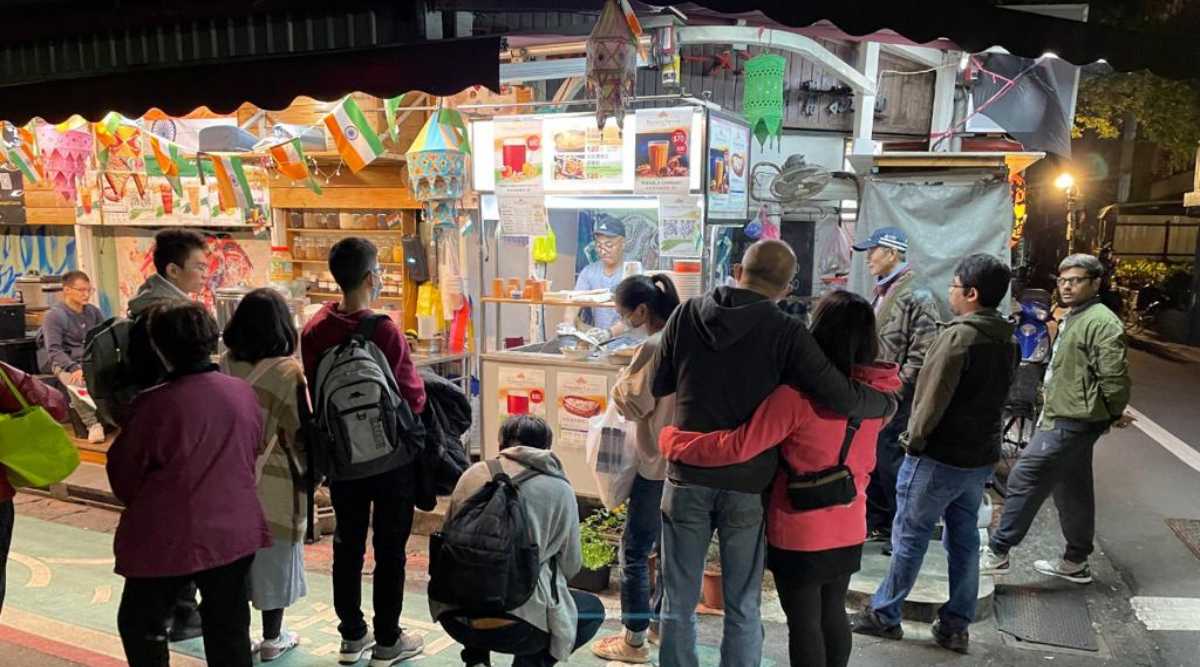 Customers wait outside Tashi Thondup Bhutia's food stall 'Namaste Taiwan' in Taipei’s Shida neighborhood. Photo credit: Tashi Thondup Bhutia
Customers wait outside Tashi Thondup Bhutia's food stall 'Namaste Taiwan' in Taipei’s Shida neighborhood. Photo credit: Tashi Thondup Bhutia For over a year now, 41-year-old Tashi Thondup Bhutia has been selling Indian food in the night market in Taipei’s Shida neighborhood. In his street-side stall called ‘Namaste Taiwan’, covered with Indian pipli lanterns and the Indian national flag hanging on a string, Bhutia sells plates of freshly prepared chana masala, chicken curry and masala chai, among other foods.
A stone’s throw from National Taiwan Normal University (NTNU), it isn’t just the institute’s many Indian students who sustain Bhutia’s work. “Indian food is good business here in Taiwan. 10 years ago, that wasn’t the case. Now there is more awareness about different spices and how they are good for health. So now they say, ‘oh Indian food; very good’,” says Bhutia.
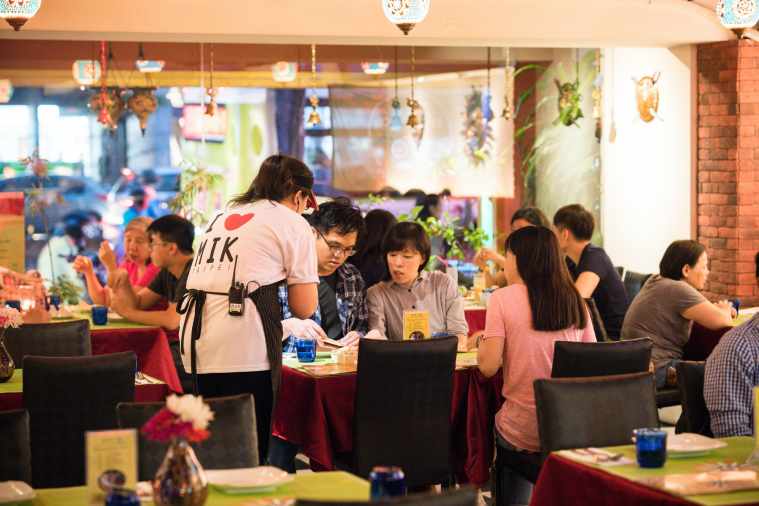 Taiwanese customers at Mayur Indian Kitchen, Taiwan. Photo credit: Mayur Srivastava
Taiwanese customers at Mayur Indian Kitchen, Taiwan. Photo credit: Mayur Srivastava When Mayur Srivastava first came to Taipei in 2007, there were just two Indian restaurants run by Indian nationals. The Indian community itself was significantly smaller than what it is today, and was mostly one comprising a handful of Indian traders and businessmen. “Back then, Taiwanese people didn’t know much about Indian food. There were a few restaurants run by Pakistanis and Bangladeshis who were selling what they claimed was Indian food, but it actually was not.”
Much has changed in the 15 years since Srivastava first arrived in Taiwan for a holiday and began working as a chef at the Westin hotel. In Taipei alone, he estimates that presently there are approximately 40 Indian restaurants, of which eight are owned by him. This number, he says, excludes food stalls in the city’s night markets, for which no specific figures were immediately available.
Some two years after the Aamir Khan-starrer ‘3 Idiots’ found popularity in Taiwan for its story and themes, Srivastava began working for a small Japanese curry restaurant called ‘Curry Empire’ in Taoyuan’s Zhongli district, approximately an hour’s drive from Taipei. Soon after he joined the establishment, the owners began transitioning the space fully into an Indian restaurant, specialising in what they called Indian “curry”.
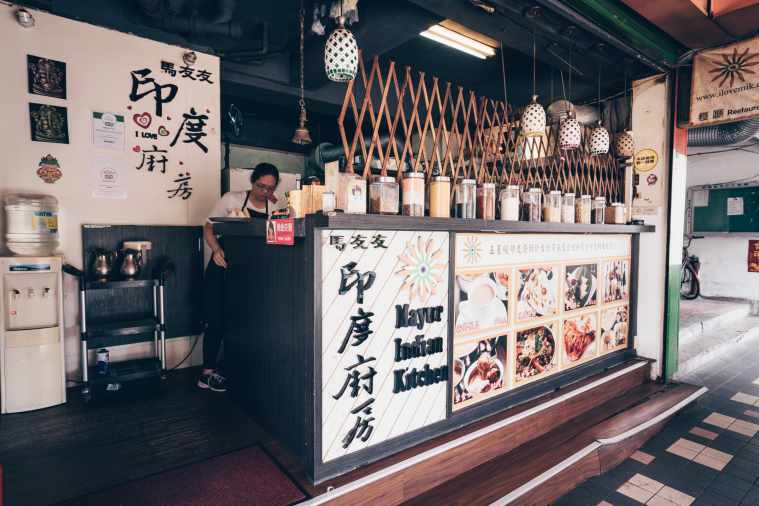 The interiors of Mayur Indian Kitchen, Taiwan. Photo credit: Mayur Srivastava
The interiors of Mayur Indian Kitchen, Taiwan. Photo credit: Mayur Srivastava “There wasn’t a demand for it but we introduced it. We used to stand outside and give naan and curry samples to try for free. They didn’t know what it was, but they would eat it and ask ‘wow, where is this available?’” Srivastava recalls.
Sana Hashmi, a visiting fellow at the Taiwan-Asia Exchange Foundation, who conducts research on Taiwan-India relations, told indianexpress.com that the popularity of Bollywood films, particularly those starring Aamir Khan, may just have contributed to increasing curiosity and awareness of Indian food in Taiwan.
It was significant because it helped create space for a cuisine that till then, had been limited to the South Asian community in Taipei and wasn’t on the mind of Taiwanese customers before. Such was the obsession with Khan’s film that an Indian restaurant came up in Taipei, calling itself ‘3 Idiots’, after the film, and remains in operation, Hashmi says.
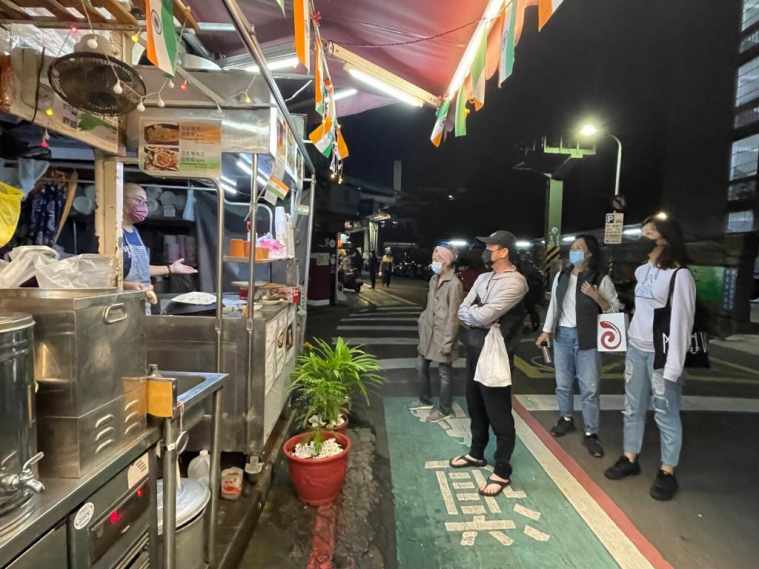 Customers line up at Tashi Thondup Bhutia’s stall ‘Namaste Taiwan’ in Taipei’s Shida neighbourhood. Photo credit: Tashi Thondup Bhutia
Customers line up at Tashi Thondup Bhutia’s stall ‘Namaste Taiwan’ in Taipei’s Shida neighbourhood. Photo credit: Tashi Thondup Bhutia While working at the Westin, after his shift ended, Srivastava began selling dosa and naan at the Shilin night market. Assisted by his wife, a Taiwanese national, he installed a tandoor in his stall, making fresh naan for customers. The dramatic movements of baking the naan, especially when prepared by his wife, were unfamiliar to his Taiwanese audience, and resulted in crowds gathering to take photos and videos. Referrals by word of mouth and social media post-2011 helped spread awareness of Indian cuisine, especially stalls that Indians were opening in night markets in Taipei, Srivastava says.
Although growing in number, the Indian community in Taiwan is relatively small. “We are just 4,500 Indian people on resident visas and I am always puzzled how we have so many Indian restaurants. In downtown Taipei, I see two Indian restaurants in a one-km radius,” Hashmi says. Most Indian restaurants cater to Taiwanese and the Indian or the larger South Asian community in Taiwan is not the focus of these restaurants, she explains.
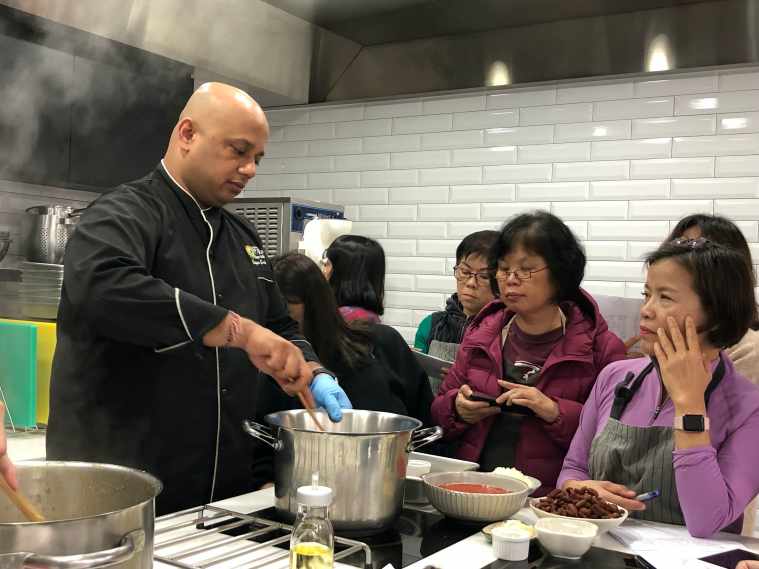 Taiwanese customers watch Mayur Srivastava prepare Indian food during a demonstration at Mayur Indian Kitchen, Taiwan. Photo credit: Mayur Srivastava
Taiwanese customers watch Mayur Srivastava prepare Indian food during a demonstration at Mayur Indian Kitchen, Taiwan. Photo credit: Mayur Srivastava Running an Indian restaurant is an expensive but profitable business in Taiwan, says Bhutia. “It is not an easy task to open Indian restaurants because Taiwan’s customs are very strict when importing Indian spices. It is also expensive to rent spaces,” Hashmi says. Still, the returns seem to be high, which has resulted in this increase in the number of Indian restaurants not just in Taipei, but also in other towns.
The administrators of the Taipei Curry Council do not know when the group was formed, but it is more than 15 years old and perhaps the only one of its kind. Very simply, it is a group of mostly immigrants in Taipei who come together once every month for a dinner of “curry” at an Indian restaurant in Taipei.
“We don’t even know who the original founders were, but it originally started as some expat men hungry for curry and Taiwanese spouses not craving it to the same extent. They would go find it themselves and it became a regular thing. It was more by circumstance than design that it was only men, and it was like that for many years,” says Anthony van Dyck, one of the administrators of the group.
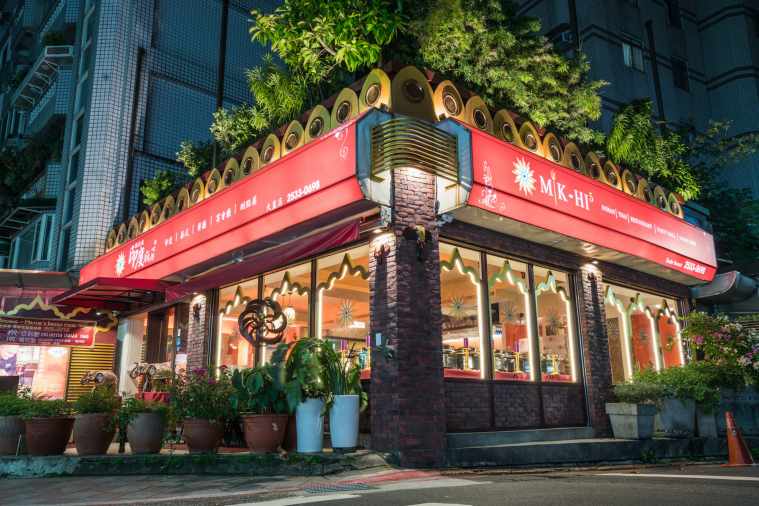 An Indian restaurant in Taipei, Taiwan. Photo credit: Mayur Srivastava
An Indian restaurant in Taipei, Taiwan. Photo credit: Mayur Srivastava The group cycles through 12 different Indian restaurants every year, rarely making a repeat visit. That the group is even able to do that in Taipei is indicative of how Indian restaurants have grown in number over the years.
Although most members of the Taipei Curry Council are immigrants from western countries, there are also a handful of Taiwanese and Indian members, who participate for the food and conversation. “This is a group of people who consistently keep coming back for Indian food or who make Indian food a part of their monthly eating out,” says Jim Klar, another administrator of the Taipei Curry Council.
“We also have some Taiwanese who like to join us and they like to be introduced to these dishes that they may not have had the courage to order on their own. We never order dishes in these restaurants. We always put ourselves in the chef’s hands and we let the restaurants decide for us,” says van Dyck.
Some two weeks ago, Hashmi shared a photo on social media of a Taiwanese restaurant near National Chengchi University in Taipei. The restaurant had butter chicken on the menu and it was sold out. It isn’t uncommon to find foods like these in cafeteria menus inside campuses or in restaurants in and around these spaces and it has little to do with the South Asian students studying there. “It’s because Taiwanese and foreigners like Indian food,” Hashmi explains.
It is a combination of factors that has contributed to the growth of Indian food in Taiwan, Srivastava says. Awareness of Indian food grew as the numbers of Indians in Taiwan increased over the past decade, a development for which he credits the India Taipei Association, an organisation under India’s Ministry of External Affairs, that is responsible for ties between India and Taipei and facilitates consular services and business, tourism, culture, science & technology and people-to-people exchanges. Although Covid-19 has impacted sales, it hasn’t been as severe in Taiwan as Bhutia had feared. For now, people are still dining out relatively frequently, helping sustain establishments, especially small business owners like him. “The most important factor was that Taiwanese people were curious about Indian food and culture. It is really because of Taiwanese customers that these restaurants are successful,” Srivastava says.
- The Indian Express website has been rated GREEN for its credibility and trustworthiness by Newsguard, a global service that rates news sources for their journalistic standards.

